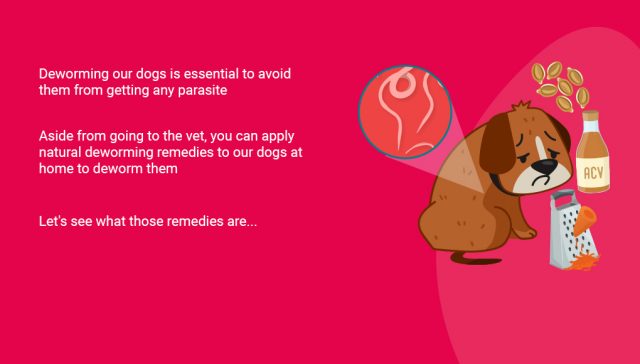
Table of Contents
Deworming our dogs is essential if we avoid getting affected by fleas or ticks running through the little buddy's body. Although many collars and chemicals effectively fight against them, we highlighted natural dewormer steps in this guide. We will explain how to deworm dogs correctly with these natural ingredients.
It would be best if you dewormed your dog for the first time after six weeks, and then it will be best to conduct a review every 3 or 4 months or perhaps every year, depending on the breed of dog. It doesn't matter whether or not it has had problems with parasites (especially internally) in its medical history. Also, consider if they live in the city or in the country, where they can be more or less susceptible to suffering depending on which parasites.
Apart from the need to go to the vet for this purpose, we can apply natural deworming remedies to our dogs at home to deworm them, depending on the parasite to be treated (fleas, ticks, or worms). Let's see what those remedies are.
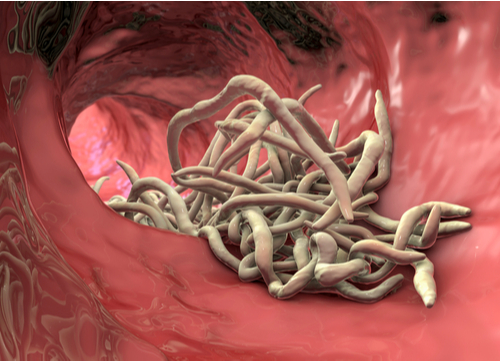
Avoiding Internal Parasites in Dogs Avoids The Need for Natural Deworming
It is essential to prevent your dog from getting infected with ticks, fleas, and other parasites. Almost all dogs become infested with parasites at some point in their life. Most develop immunity that keeps them at bay. However, under conditions of stress or lack of proper healthcare, this immunity can decrease. The parasites increase in number and cause intestinal infection, weight loss, anemia, diarrhea, blood in the stool … etc.
The Ascaris, hookworms, or whipworms are parasites that, when the larval stage of tissue migrates, dogs develop a high level of immunity against them. In contrast, whipworms and tapeworms do not have a migratory phase and cause less immunity. An adequate diagnosis is required to know which antiparasitic will be more effective against the species that your dog suffers from, so you must go to your veterinarian before any symptoms. Most puppies are infested with nematodes. Your veterinarian will analyze the puppy's feces to determine if it has nematodes and other parasites, prescribing the most suitable antiparasitic.
Puppies are generally dewormed at two weeks of age and then at 4, 6, and 8 weeks. It is important to deworm the puppy regularly, at least every 3 months. Generally, they are given a broad-spectrum dewormer, which is effective against different types of parasites. In the case of adult dogs, they are given an anti-parasitic pill every 2-4 months. Most dogs have Ascaris in cystic larvae, but adult roundworm infestation in a healthy dog is rare.
The whipworms are frequent causes of acute and chronic diarrhea in adult dogs and require specific antiparasitic. The tapeworms are common in dogs but cause few symptoms but can be seen in the stool. The whipworm is rare and difficult to remove. It is important to maintain good hygiene for both the dog and its accommodation to avoid further infections. Remember that dirt floors are ideal for developing eggs and larvae, so if your dog is in a kennel, it is better than it has a concrete floor, and it is kept very clean.

Avoiding External Parasites in Dogs
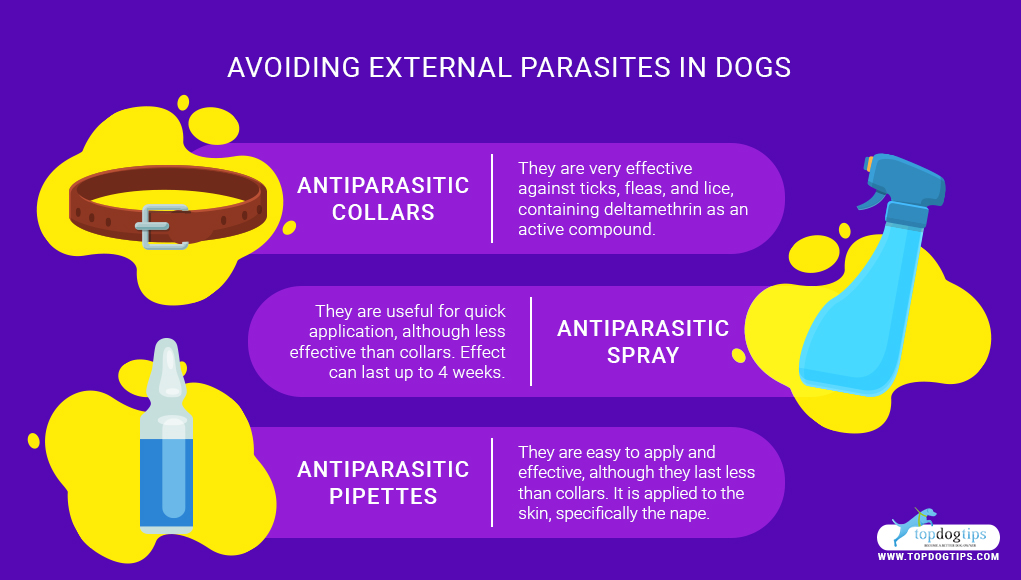
The most common external parasites in a dog are lice, mites, ticks, and fleas. Among the most common deworming methods are:
Antiparasitic Collars
They are very effective against ticks, fleas, and lice. Some collars are effective against mosquitoes and leishmaniasis. There are many brands on the market. Those containing deltamethrin as an active principle are ideal since this compound acts effectively against many types of parasites. Look for one that is water-resistant so that it does not lose its effectiveness in contact with it. Choose the most suitable for the breed and age of your dog.
Antiparasitic Spray
They are useful for quick application, although less effective than collars. If they have dimethicone, their effect can last up to 4 weeks.
Antiparasitic Pipettes
They are easy to apply and effective, although they last less than collars. It would be best if you did not bathe your dog 24 hours before its application or during the next day. You should apply it to the skin, not the hair. It is applied to the nape, the application to the withers area, and the tail's beginning.
Steps to Properly Administer Natural Deworming for Dogs
Depending on the parasites that affect your dog, you can find some natural remedies. We will explain them to you here.
Natural Deworming Your Dog from Fleas
Fleas affect many dogs, especially during the summer, to avoid them and kill them, and there is no treatment like applying these natural remedies.
- Collar with Essential Oils: Apply ten drops of eucalyptus essential oil and ten drops of lavender essential oil on a cord or handkerchief. Other suitable essential oils are peppermint, cedar, and citronella.
- Vinegar: White wine vinegar is particularly suitable for removing fleas and can be applied to the dog's hair after diluting it with water and spraying it on a soft cloth. You can also use vinegar to wash our dogs' toys periodically. The vinegar helps to sterilize them against pests.
- Lemon: Another effective natural remedy is to use four squeezed lemons mixed in half a liter of water with 2 tablespoons of baking soda. Then, apply them with a clean cloth on the animal's hair.
Natural Deworming Your Dog from Ticks
Ticks affect many dogs, too, so you can prevent them from being bitten with these natural remedies.
Apple Cider Vinegar
Apple cider vinegar can be used when bathing your dog. In this case, try to rub the parts most affected by the tick attack, such as the neck, ears, and legs.
Essential Oils
Two essential oils, lavender and eucalyptus, can help you eliminate ticks from your dog. Its fragrance is particularly unpleasant for such pests. If you add thyme, it can obtain other important benefits since this element strengthens the dog's immune system and helps keep bacteria away.
Vegetable Oils
If you want to add to the diet, there are oils of vegetable origin (sunflower, flax, borage) that, in addition to fighting ticks, perform an effective soothing action against itching. Use 1 teaspoon every 3 days to add to your pets' food, and you will get good results without resorting to the usual chemicals that can be highly toxic.
Natural Deworming the Worm Dog
If your dog has expelled small worms in his stool, you should go to the vet immediately. In addition to the vet prescription, here are natural deworming remedies that you can incorporate into their diet:
Carrot
Carrots are vermifuge if cut into small pieces and put into dog foods. The carrot pieces do not digest, so the nutritional values of the food prepared for the dog will not change in any way. However, the carrot will “scrape” the mucus from the intestinal walls, thus eliminating the parasites it contains. In a few hours, the dog will expel the carrot pieces, along with the mucus and worms. Adding a grated carrot to your dog's normal food will help boost the immune system and fight infection.
Pumpkin Seeds
Native American tribes discovered the benefits of pumpkin seeds centuries ago. They used pumpkin seeds and their pulp to treat many conditions. These conditions are kidney complications, urinary problems, healing wounds, and the treatment of parasitic diseases in men and dogs. An amino acid present in pumpkin seeds called cucurbitacin paralyzes the worms and expels them from the digestive tract. In addition to its ability to expel parasites, pumpkin seeds have many other benefits. They are a source of fiber, iron, magnesium, zinc, potassium, folate, amino acids, calcium, and niacin.
Fasting
If you want a simple and effective way to eliminate worms, try putting your dog on a fast, as a 24-hour fast once a week will help expel the worms and prevent them from returning. Worms need food to survive, and a few hours of fasting will weaken them and cause them to emerge. Of course, always consult your vet before fasting the dog, especially if it is not in good health.
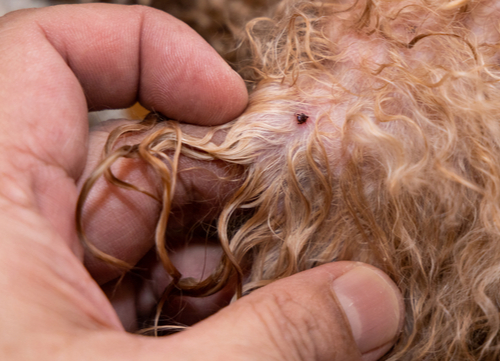
Observing Your Dog's Skin
Combining the collar with an antiparasitic pipette or a spray can be key to achieving higher protection. Also, regularly examine your dog, especially if you have been in areas where there may be parasites (especially fleas or ticks), to proceed with their elimination and treatment as soon as possible.
Frequently Asked Questions About Natural Deworming
Are Home Remedies Effective?
According to scientific studies, natural medicine, available to everyone in our kitchens, is efficient in preventing intestinal worms.
However, use home remedies under a veterinarian's supervision to ensure that they effectively and correctly protect our dog. Never use them on your own without advice from an animal medicine expert, as every dog is different.
In cases of a large infestation, the ivermectin group's antiparasitics are of choice due to their rapidity in their effectiveness. Combining therapy of antiparasitic tablets and natural deworming medicine should always be used under medical supervision.
What are some home remedies for worms in dogs?
Let's look at what products and foods, thanks to their composition, are excellent for the treatment of worms. Remember always to use the amounts indicated by your veterinarian since, depending on the dog's age and weight, the doses are highly variable.
Some of these remedies are beneficial in small amounts but very harmful in large amounts, and please do not experiment on your own. You could put your dog's health at risk.
Pumpkin
Use the raw seeds of a pumpkin as a natural deworming remedy. Pumpkin seeds contain up to 35% cucurbitacin, an active ingredient that has anthelmintic properties. The way to use them is by grinding the seeds and adding them to your food, as they are a very effective natural anthelmintic. The indicative dose is a small spoonful of crushed seeds for every ten kilos of weight.
Pineapple
Did you know that dogs can eat pineapple? Thanks to the anti-inflammatory and immunostimulating activity of bromelain, an active pineapple principle, we can use it in pets with parasitosis to attenuate the gastrointestinal lesions caused by these parasites.
Garlic
We must be very cautious with garlic since, in high quantities, it can be very toxic. However, it is an excellent antibiotic and immunostimulant with a great antiparasitic effect to eliminate worms in small amounts.
Areca Palm Seeds
These seeds act as a powerful antiparasitic and are effective in reducing the infestation symptoms and regulating the dog's nervous system. As with pumpkin seeds, we must crush them and give the dog their food in the amount indicated by the veterinarian.
Wormwood
Studies have shown that wormwood extract has an anthelmintic effect. It should be noted that there are parts of the plant that contain a substance called tannins, which can be very strong for your dog and irritating to his liver and kidneys.
Carrots
Carrots are a great snack for dogs, and research has shown that dogs that eat carrots are less likely to suffer from internal parasites. You can break off small pieces of carrot that you can add to their meal. Your dog does not completely digest the carrot pieces. This will help to wash away their worms with their feces.
Fasting
Always under the supervision of a veterinarian, fasting can help a dog get rid of a large part of the worms. By not receiving food, they will be expelled or even come out by themselves through the rectum with the feces.
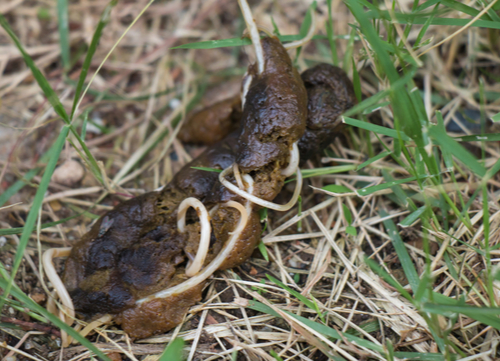
How Do You Know If a Dog Has Worms?
You can notice it through unusual symptoms in your pet, such as mucous (with phlegm) and bloody stools, decay, loss of appetite, and licking his anus a lot.
If the infestation is short, the eggs are often not visible in the feces. You will see that if the infestation has been established for a long time, worms will come out in the stool. Worms that affect the heart and lungs are not apparent at first glance. So it is always necessary to have the dog checked at a veterinary clinic. Keeping our dog free of internal parasites will make it a healthier, happier, and longer-lived dog.
The Unnatural Treatment to Combat Parasites?
Faced with a large infestation of parasites, natural medicine is slower. In the face of the multiple damages that parasites cause to your pet, you can use natural dewormer combined with antiparasitics for industrial use, but always under medical prescription.
All veterinary clinics sell tablets from the benzimidazole group, which we must give to our dogs once every three months to keep them healthy and protected. These pills are quite inexpensive, and we have to mix them with food.
But depending on the type of worms the dog has, some, such as giardia or the well-known heartworm, need more aggressive antibiotic treatments to be effective. Hence, it is important to always have deworming supervised by a veterinarian.
Conclusion
Deworming our dog is important to avoid infections. Several internal parasites habitually coexist with our dogs. It is convenient to deworm them internally by consuming a pill every 2-4 months. Consult your vet. Hygiene correct is essential to control infestations.
In case you observe worms, diarrhea, blood in the stool, anemia, or any other symptom that may indicate the presence of parasites. It's time to go to your veterinarian. External parasites are fought with collars, sprays, pipettes, and strict observation.
Many natural remedies are effective against parasites. Some can be toxic to your dog, so you must make sure you're well-educated before using them. If you are using a natural remedy, discuss it with your vet to make sure it is not dangerous for your dog.
Read Next: The Guide on How to Deworm, a Dog














